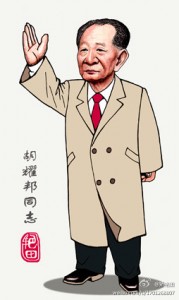Chinese Web users skirted the country's tough Internet censors to pay homage to former communist party leader and popular reformer Hu Yaobang, whose death 24 years ago sparked the Tiananmen Square protests.
Hu's support for free market reforms and more government transparency during his time as the Chinese Communist Party’s General Secretary from 1982 to 1987 were welcomed by many Chinese, but made him the enemy of some powerful party leaders.
Since his death, Hu, who was purged from the communist party, has remained a taboo subject in China. Despite his official rehabilitation by the Chinese government in 2005, Hu's name is still blocked on China’s most popular microblogging site Sina Weibo.
A search his name on Weibo returned no results on April 15, it says:
根据相关法律法规和政策,“胡耀邦”搜索结果未予显示。
According to related laws and policies, search results for “Hu Yaobang” cannot be relayed.
However, Web users tried to circumvent the censors by adding a space or candle symbols amid the three Chinese characters of his name. Some web users simply quote Hu or light virtual candles without mentioning him by name.
And some state media unexpectedly joined in the remembrance. China’s state-controlled Liberation Daily ran a eulogy [zh] of Hu, which was shared thousands of times on Weibo:

Cartoon artist “Jiao Yantian” created a cartoon of Hu Yaobang (picture from Sina Weibo)
在中国改革到了需要狠推一步、击一猛掌的新的历史时刻,缅怀耀邦,有很强烈的现实意义。纪念胡耀邦,就要像他那样,锐意改革,勇于创新。
Commemorating Yaobang is of great practical significance at a time when China needs to take further steps in reform and venture into another chapter in history. As we remember Hu Yaobang, we should, just like him, have the determination to reform and the courage to innovate.
Lawyer Xu Xin quoted [zh] Hu:
想起他曾说:贪污腐化,以权谋私能否制止,关系到党的生死存亡;要用最大的决心、最大的毅力、最大的韧性,狠狠地抓,坚持到底;抓这件事不能讨好,不能怕得罪人。
I remember he said: “Whether corruption and abuse of power can be stopped is essential to the life and death of the party; we should try the greatest determination perseverance and toughness to deal with this issue, until the end; To deal with this issue, we cannot please people, or be afraid of offending people.
Cartoonist “Jiao Yantian” created a cartoon of Hu and commented [zh]:
说真话人民知音,办实事一代伟人!
Speak the truth and you earn the friendship of the people, do real things and you are great for a generation.
Even Hu Xijin, editor-in-chief of the Chinese state-run tabloid Global Times, weighed in [zh]:
我们应有还原历史的勇气。我们应有跳出过去是是非非的心胸。我们应有从过去汲取走向未来的力量和智慧的能力。在耀邦逝世周年的日子里,怀念并思考。
We should have the courage to restore history. We should learn from the past, and walk towards the future with strength and wisdom. The anniversary of Hu Yaobang's death, we commemorate and reflect.
Some users used his comment as a springboard for comparisons between Hu’s era and today’s China.
Web user “Tan Feizi” wrote [zh]:
胡耀邦时代是中国历史上相对比较宽容开明的时代。那时的年轻人都很关心国家大事,热衷于讨论哲学问题,也是整个中国社会欣欣向荣的时代。相比而言,在思想上和社会的宽容上比之于现在要好很多。
Hu Yaobang’s time was a relatively tolerant and liberal era in the history of China when young people were very concerned about national affairs and keen to discuss philosophical questions. Chinese society as a whole was thriving then. It was much better than today in terms of ideology and social tolerance.
Another web user “0931_Lee” pointed out [zh] the lack of great leaders in China since Hu's death:
二十四年了 你为之奋斗了一生的国家 变的越来越差 到目前为止再也没有出现过像你和赵公那样伟大的人物 你像灯塔一样在指引着我们 永远怀念您。
Twenty-four years. The country you fought a lifelong for is getting worse. So far there have not been any great man like you and Zhao Ziyang. You guide us like a lighthouse, we will always remember you.







3 comments